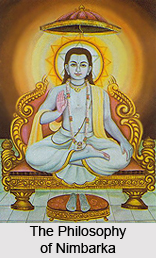 Concept of Jiva according to Nimbarka Dvaitadvaita doctrine is that jiva is a part of the qualified and determinate being of God to whom it is secondary and pronominal in a prime sense. The Jiva is different from Him, as he is created and dependent and controlled by him. As the Jiva is inseparable, the Jiva is also non-different from him.
Concept of Jiva according to Nimbarka Dvaitadvaita doctrine is that jiva is a part of the qualified and determinate being of God to whom it is secondary and pronominal in a prime sense. The Jiva is different from Him, as he is created and dependent and controlled by him. As the Jiva is inseparable, the Jiva is also non-different from him.
Jiva is described as it is neither born nor dies. He is eternal and is self-conscious. He is a knower and actor. He pervades the whole body and gets experiences through it Consciousness is the substrate and the attribute of the Jiva. Jiva is a free agent and that freedom is subject to the will of Isvara. God impels jiva to act or abstain from acting according to the tendencies and merits and demerits acquired by the Jiva by his past actions. Avidya in this system is the accumulating load of Karma and not a special category. Though atomic, the Jiva pervades by his attributive knowledge that is capable of expansion like the light of a lamp. The Jiva is atomic not in the sense of its dimension but to show that he is a monad with a self-identity. The Jiva is an Amsa, potency, of Isvara and so he retains his essential nature. When liberated, he realizes himself in his true relationship with the Lord.
Kinds of Jivas in Nimbarka`s Philosophy
Nimbarka`s system recognizes a kind of Taratamya among the Jivas. Some of these Jivas are eternally tree and they are never in any repression. They are occupied in heavenly service. Muktas are the other kind of Jivas. They have been liberated by grace of Lord. Some jives seek the bliss of serving the Lord while others are satisfied with their inherent bliss as Atman. Again there are souls who have bindings. Some souls are seekers after liberation and keep striving for consummation. There are Jivas who are unaware to spiritual values and are over-sentimental in worldliness. These souls are bound eternally. The Jivas are bound by the cycle of births and deaths by Avidya which according to Nimbarka`s system is the load of beginning less Karma.
In case of Nitya baddhas, they are by nature prone to do evil and have no ethical standard in life. They are subject to what the Gita describes as demoniac nature. Three gateways are open to them and they are: sexuality, anger and greed. As they have lost the opportunity for higher evolution possible in human birth, they suffer in heaven then come back to this world and get incarnations in animal bodies. Those souls who accept spiritual values and strive for liberation from Samsara evolve to higher levels of spiritual development through several births on earth and in heavens according to their actions until the grace of the Lord releases them.
Those jivas who have done good deeds but yet not eligible for release go by the Dhumadi-marga, the Path of Smoke. Several deities take the Jivas to the Lunar Sphere where they enjoy the fruits of their good deeds. The Jivas who have attained Bhakti as well as eligible for liberation through the Lord`s grace, go by the Arciradi-marga, the Path of Light.
In Nimbarka`s system of realism there is no Jivan-mukti. Mukti is attained only after Prarabdha Karma is exhausted on the death of the present body. What the Jiva realizes in liberation is `non-difference in difference` with the Paramatman.




















